Evaluating Organizational Culture & Employee Motivation at Tesco
VerifiedAdded on 2023/06/18
|15
|3145
|415
Report
AI Summary
This report provides a comprehensive analysis of Tesco's organizational culture, communication strategies, and employee motivation. It utilizes secondary research, including Handy's cultural model and Maslow's theory of motivation, to evaluate Tesco's internal environment. The report explores how Tesco's culture impacts organizational effectiveness through communication and employee motivation, examining the role of communication models and motivational theories. Furthermore, it incorporates primary research in the form of a survey to gather employee perspectives on Tesco's culture, motivation levels, and reward systems. The findings from both secondary and primary research are interpreted to provide insights into how Tesco can further enhance its success by leveraging its organizational culture. Desklib offers a wealth of similar resources, including past papers and solved assignments, for students seeking to deepen their understanding of business and management topics.

Paraphrase This Document
Need a fresh take? Get an instant paraphrase of this document with our AI Paraphraser
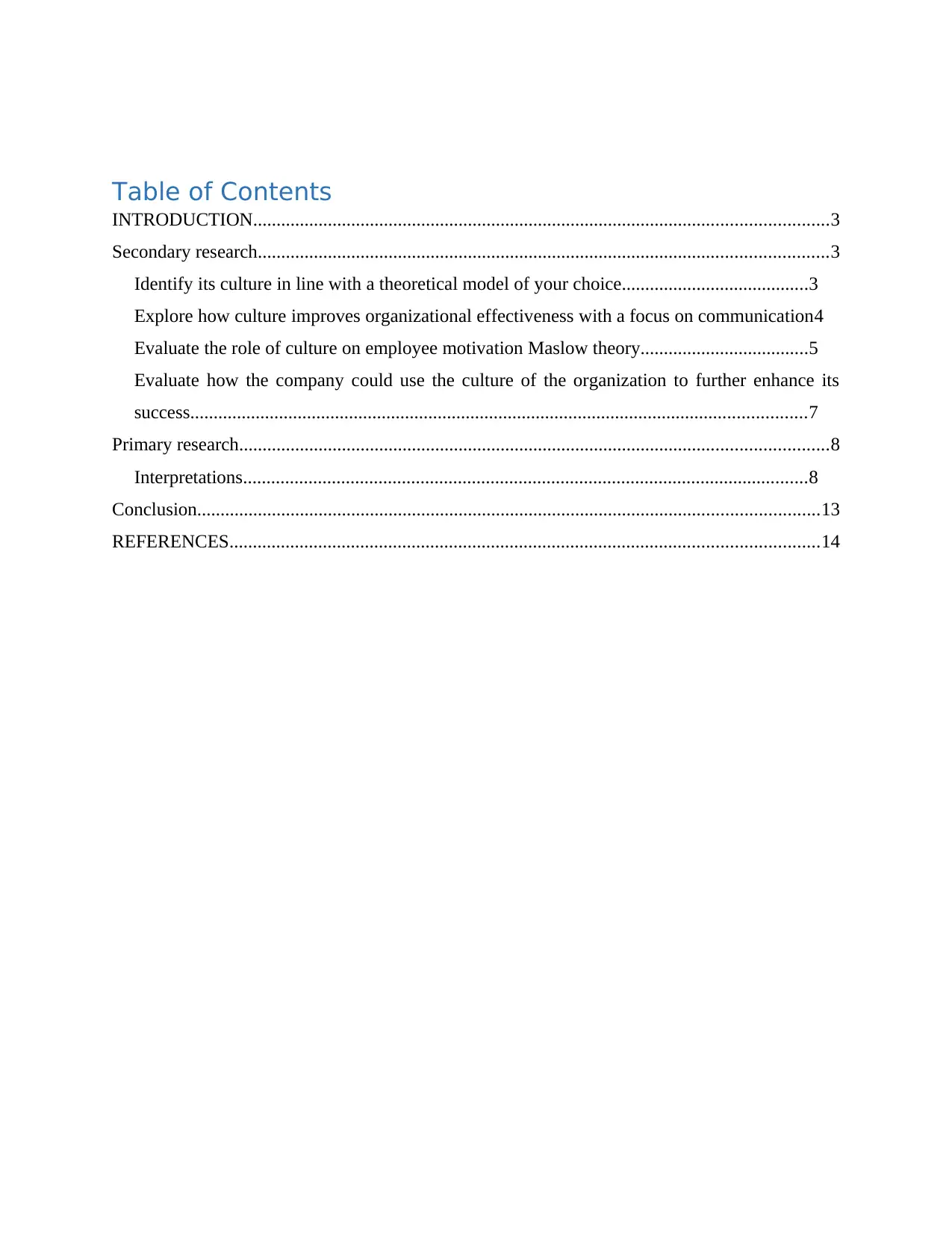
Table of Contents
INTRODUCTION...........................................................................................................................3
Secondary research..........................................................................................................................3
Identify its culture in line with a theoretical model of your choice........................................3
Explore how culture improves organizational effectiveness with a focus on communication4
Evaluate the role of culture on employee motivation Maslow theory....................................5
Evaluate how the company could use the culture of the organization to further enhance its
success....................................................................................................................................7
Primary research..............................................................................................................................8
Interpretations.........................................................................................................................8
Conclusion.....................................................................................................................................13
REFERENCES..............................................................................................................................14
INTRODUCTION...........................................................................................................................3
Secondary research..........................................................................................................................3
Identify its culture in line with a theoretical model of your choice........................................3
Explore how culture improves organizational effectiveness with a focus on communication4
Evaluate the role of culture on employee motivation Maslow theory....................................5
Evaluate how the company could use the culture of the organization to further enhance its
success....................................................................................................................................7
Primary research..............................................................................................................................8
Interpretations.........................................................................................................................8
Conclusion.....................................................................................................................................13
REFERENCES..............................................................................................................................14
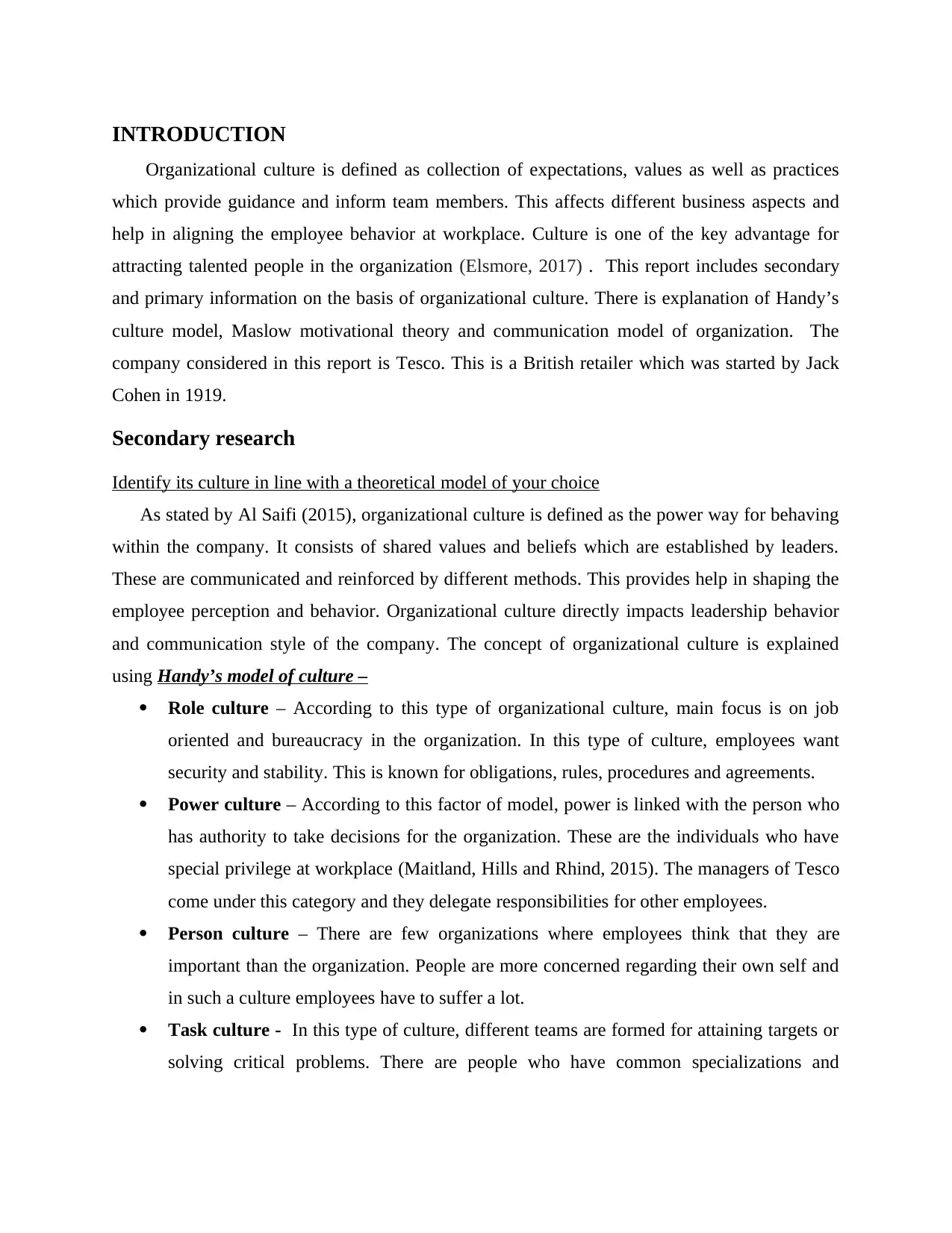
INTRODUCTION
Organizational culture is defined as collection of expectations, values as well as practices
which provide guidance and inform team members. This affects different business aspects and
help in aligning the employee behavior at workplace. Culture is one of the key advantage for
attracting talented people in the organization (Elsmore, 2017) . This report includes secondary
and primary information on the basis of organizational culture. There is explanation of Handy’s
culture model, Maslow motivational theory and communication model of organization. The
company considered in this report is Tesco. This is a British retailer which was started by Jack
Cohen in 1919.
Secondary research
Identify its culture in line with a theoretical model of your choice
As stated by Al Saifi (2015), organizational culture is defined as the power way for behaving
within the company. It consists of shared values and beliefs which are established by leaders.
These are communicated and reinforced by different methods. This provides help in shaping the
employee perception and behavior. Organizational culture directly impacts leadership behavior
and communication style of the company. The concept of organizational culture is explained
using Handy’s model of culture –
Role culture – According to this type of organizational culture, main focus is on job
oriented and bureaucracy in the organization. In this type of culture, employees want
security and stability. This is known for obligations, rules, procedures and agreements.
Power culture – According to this factor of model, power is linked with the person who
has authority to take decisions for the organization. These are the individuals who have
special privilege at workplace (Maitland, Hills and Rhind, 2015). The managers of Tesco
come under this category and they delegate responsibilities for other employees.
Person culture – There are few organizations where employees think that they are
important than the organization. People are more concerned regarding their own self and
in such a culture employees have to suffer a lot.
Task culture - In this type of culture, different teams are formed for attaining targets or
solving critical problems. There are people who have common specializations and
Organizational culture is defined as collection of expectations, values as well as practices
which provide guidance and inform team members. This affects different business aspects and
help in aligning the employee behavior at workplace. Culture is one of the key advantage for
attracting talented people in the organization (Elsmore, 2017) . This report includes secondary
and primary information on the basis of organizational culture. There is explanation of Handy’s
culture model, Maslow motivational theory and communication model of organization. The
company considered in this report is Tesco. This is a British retailer which was started by Jack
Cohen in 1919.
Secondary research
Identify its culture in line with a theoretical model of your choice
As stated by Al Saifi (2015), organizational culture is defined as the power way for behaving
within the company. It consists of shared values and beliefs which are established by leaders.
These are communicated and reinforced by different methods. This provides help in shaping the
employee perception and behavior. Organizational culture directly impacts leadership behavior
and communication style of the company. The concept of organizational culture is explained
using Handy’s model of culture –
Role culture – According to this type of organizational culture, main focus is on job
oriented and bureaucracy in the organization. In this type of culture, employees want
security and stability. This is known for obligations, rules, procedures and agreements.
Power culture – According to this factor of model, power is linked with the person who
has authority to take decisions for the organization. These are the individuals who have
special privilege at workplace (Maitland, Hills and Rhind, 2015). The managers of Tesco
come under this category and they delegate responsibilities for other employees.
Person culture – There are few organizations where employees think that they are
important than the organization. People are more concerned regarding their own self and
in such a culture employees have to suffer a lot.
Task culture - In this type of culture, different teams are formed for attaining targets or
solving critical problems. There are people who have common specializations and
⊘ This is a preview!⊘
Do you want full access?
Subscribe today to unlock all pages.

Trusted by 1+ million students worldwide
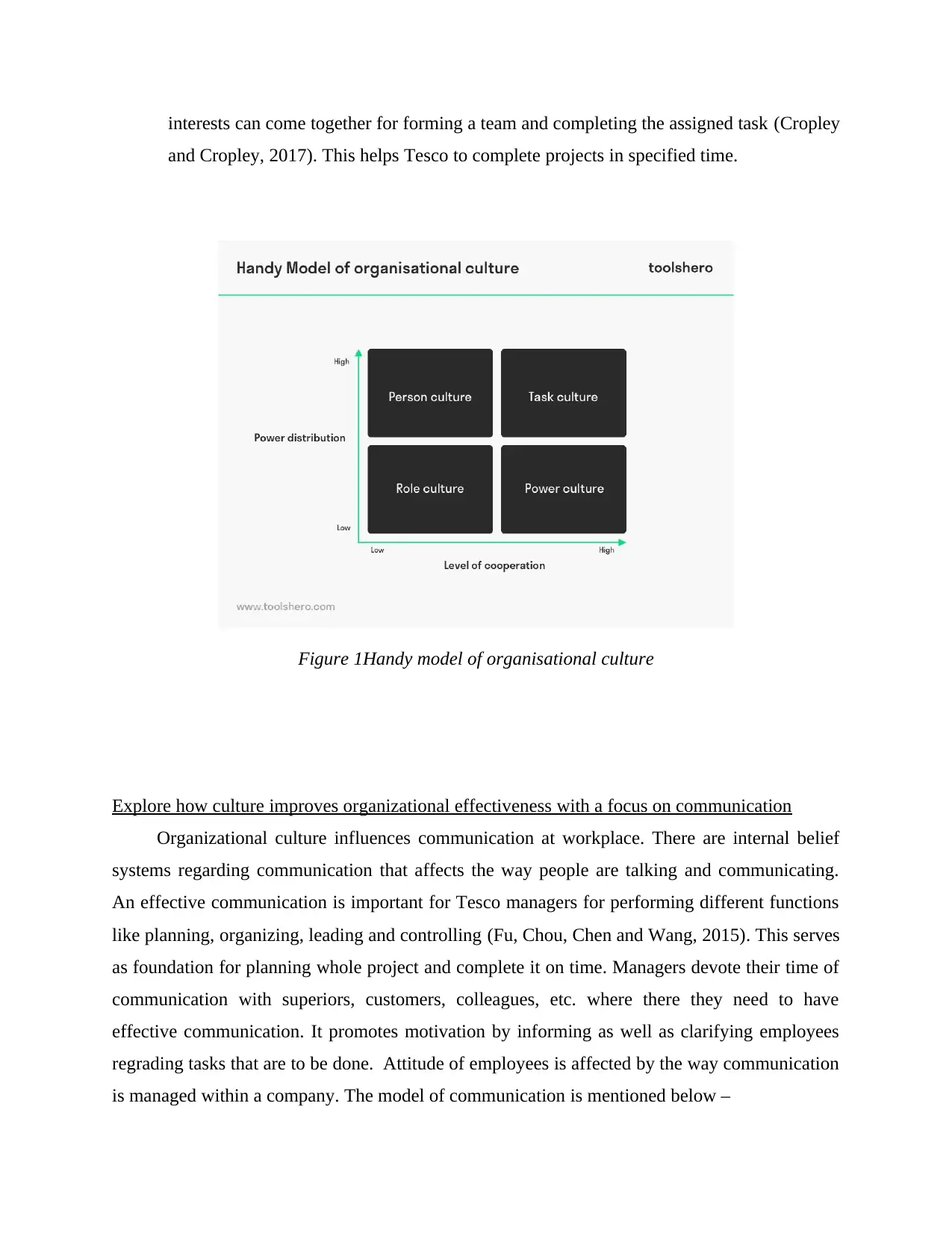
interests can come together for forming a team and completing the assigned task (Cropley
and Cropley, 2017). This helps Tesco to complete projects in specified time.
Figure 1Handy model of organisational culture
Explore how culture improves organizational effectiveness with a focus on communication
Organizational culture influences communication at workplace. There are internal belief
systems regarding communication that affects the way people are talking and communicating.
An effective communication is important for Tesco managers for performing different functions
like planning, organizing, leading and controlling (Fu, Chou, Chen and Wang, 2015). This serves
as foundation for planning whole project and complete it on time. Managers devote their time of
communication with superiors, customers, colleagues, etc. where there they need to have
effective communication. It promotes motivation by informing as well as clarifying employees
regrading tasks that are to be done. Attitude of employees is affected by the way communication
is managed within a company. The model of communication is mentioned below –
and Cropley, 2017). This helps Tesco to complete projects in specified time.
Figure 1Handy model of organisational culture
Explore how culture improves organizational effectiveness with a focus on communication
Organizational culture influences communication at workplace. There are internal belief
systems regarding communication that affects the way people are talking and communicating.
An effective communication is important for Tesco managers for performing different functions
like planning, organizing, leading and controlling (Fu, Chou, Chen and Wang, 2015). This serves
as foundation for planning whole project and complete it on time. Managers devote their time of
communication with superiors, customers, colleagues, etc. where there they need to have
effective communication. It promotes motivation by informing as well as clarifying employees
regrading tasks that are to be done. Attitude of employees is affected by the way communication
is managed within a company. The model of communication is mentioned below –
Paraphrase This Document
Need a fresh take? Get an instant paraphrase of this document with our AI Paraphraser
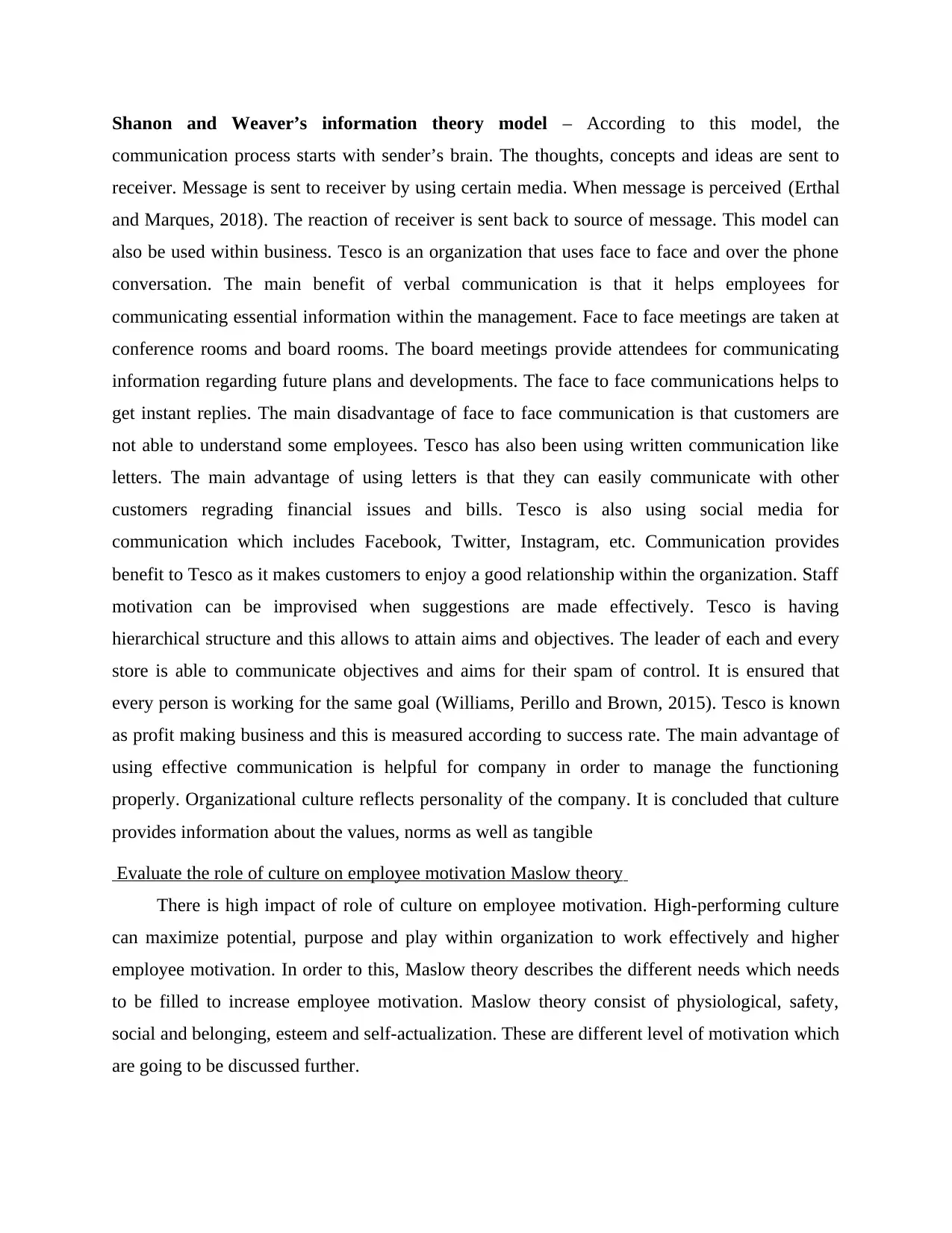
Shanon and Weaver’s information theory model – According to this model, the
communication process starts with sender’s brain. The thoughts, concepts and ideas are sent to
receiver. Message is sent to receiver by using certain media. When message is perceived (Erthal
and Marques, 2018). The reaction of receiver is sent back to source of message. This model can
also be used within business. Tesco is an organization that uses face to face and over the phone
conversation. The main benefit of verbal communication is that it helps employees for
communicating essential information within the management. Face to face meetings are taken at
conference rooms and board rooms. The board meetings provide attendees for communicating
information regarding future plans and developments. The face to face communications helps to
get instant replies. The main disadvantage of face to face communication is that customers are
not able to understand some employees. Tesco has also been using written communication like
letters. The main advantage of using letters is that they can easily communicate with other
customers regrading financial issues and bills. Tesco is also using social media for
communication which includes Facebook, Twitter, Instagram, etc. Communication provides
benefit to Tesco as it makes customers to enjoy a good relationship within the organization. Staff
motivation can be improvised when suggestions are made effectively. Tesco is having
hierarchical structure and this allows to attain aims and objectives. The leader of each and every
store is able to communicate objectives and aims for their spam of control. It is ensured that
every person is working for the same goal (Williams, Perillo and Brown, 2015). Tesco is known
as profit making business and this is measured according to success rate. The main advantage of
using effective communication is helpful for company in order to manage the functioning
properly. Organizational culture reflects personality of the company. It is concluded that culture
provides information about the values, norms as well as tangible
Evaluate the role of culture on employee motivation Maslow theory
There is high impact of role of culture on employee motivation. High-performing culture
can maximize potential, purpose and play within organization to work effectively and higher
employee motivation. In order to this, Maslow theory describes the different needs which needs
to be filled to increase employee motivation. Maslow theory consist of physiological, safety,
social and belonging, esteem and self-actualization. These are different level of motivation which
are going to be discussed further.
communication process starts with sender’s brain. The thoughts, concepts and ideas are sent to
receiver. Message is sent to receiver by using certain media. When message is perceived (Erthal
and Marques, 2018). The reaction of receiver is sent back to source of message. This model can
also be used within business. Tesco is an organization that uses face to face and over the phone
conversation. The main benefit of verbal communication is that it helps employees for
communicating essential information within the management. Face to face meetings are taken at
conference rooms and board rooms. The board meetings provide attendees for communicating
information regarding future plans and developments. The face to face communications helps to
get instant replies. The main disadvantage of face to face communication is that customers are
not able to understand some employees. Tesco has also been using written communication like
letters. The main advantage of using letters is that they can easily communicate with other
customers regrading financial issues and bills. Tesco is also using social media for
communication which includes Facebook, Twitter, Instagram, etc. Communication provides
benefit to Tesco as it makes customers to enjoy a good relationship within the organization. Staff
motivation can be improvised when suggestions are made effectively. Tesco is having
hierarchical structure and this allows to attain aims and objectives. The leader of each and every
store is able to communicate objectives and aims for their spam of control. It is ensured that
every person is working for the same goal (Williams, Perillo and Brown, 2015). Tesco is known
as profit making business and this is measured according to success rate. The main advantage of
using effective communication is helpful for company in order to manage the functioning
properly. Organizational culture reflects personality of the company. It is concluded that culture
provides information about the values, norms as well as tangible
Evaluate the role of culture on employee motivation Maslow theory
There is high impact of role of culture on employee motivation. High-performing culture
can maximize potential, purpose and play within organization to work effectively and higher
employee motivation. In order to this, Maslow theory describes the different needs which needs
to be filled to increase employee motivation. Maslow theory consist of physiological, safety,
social and belonging, esteem and self-actualization. These are different level of motivation which
are going to be discussed further.
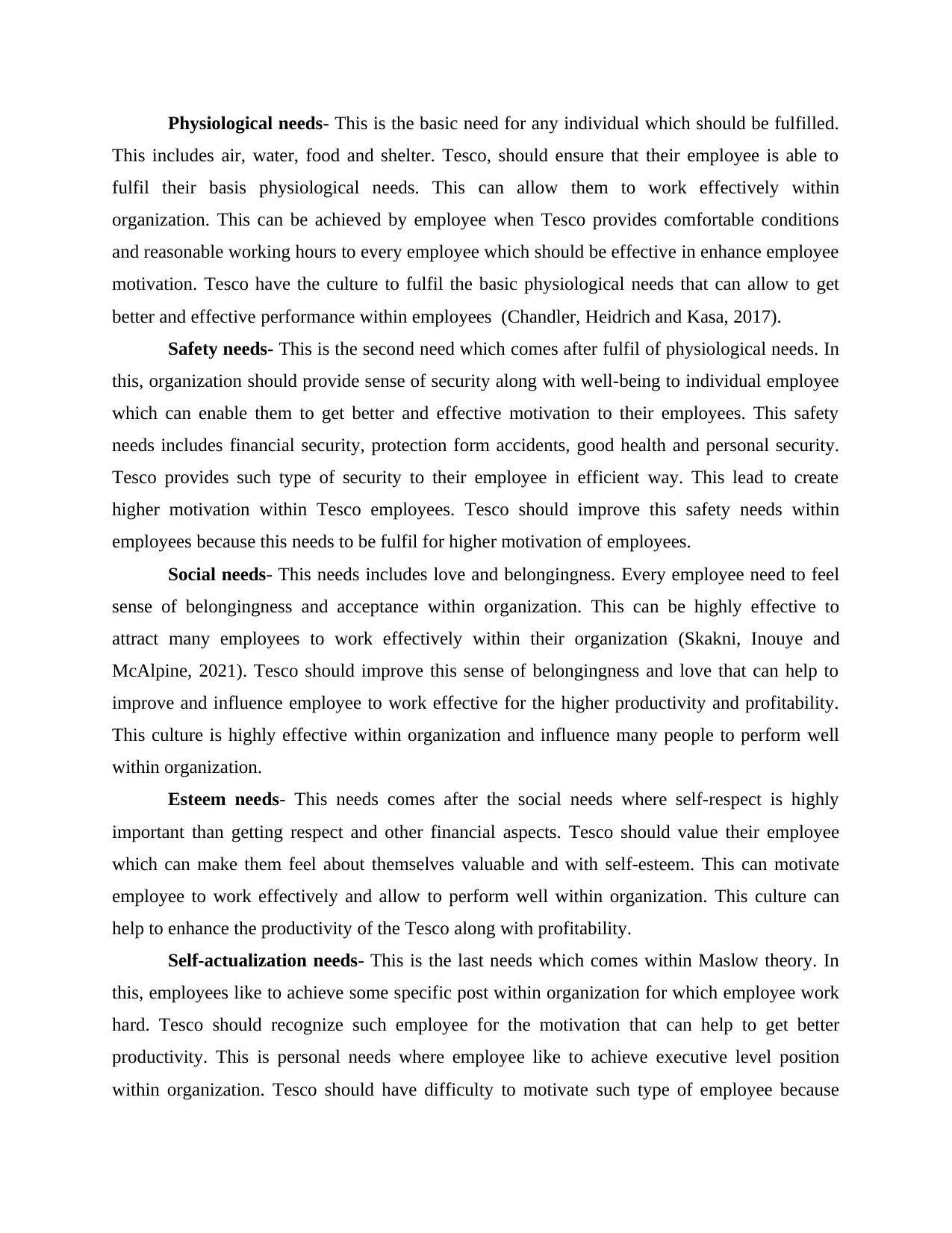
Physiological needs- This is the basic need for any individual which should be fulfilled.
This includes air, water, food and shelter. Tesco, should ensure that their employee is able to
fulfil their basis physiological needs. This can allow them to work effectively within
organization. This can be achieved by employee when Tesco provides comfortable conditions
and reasonable working hours to every employee which should be effective in enhance employee
motivation. Tesco have the culture to fulfil the basic physiological needs that can allow to get
better and effective performance within employees (Chandler, Heidrich and Kasa, 2017).
Safety needs- This is the second need which comes after fulfil of physiological needs. In
this, organization should provide sense of security along with well-being to individual employee
which can enable them to get better and effective motivation to their employees. This safety
needs includes financial security, protection form accidents, good health and personal security.
Tesco provides such type of security to their employee in efficient way. This lead to create
higher motivation within Tesco employees. Tesco should improve this safety needs within
employees because this needs to be fulfil for higher motivation of employees.
Social needs- This needs includes love and belongingness. Every employee need to feel
sense of belongingness and acceptance within organization. This can be highly effective to
attract many employees to work effectively within their organization (Skakni, Inouye and
McAlpine, 2021). Tesco should improve this sense of belongingness and love that can help to
improve and influence employee to work effective for the higher productivity and profitability.
This culture is highly effective within organization and influence many people to perform well
within organization.
Esteem needs- This needs comes after the social needs where self-respect is highly
important than getting respect and other financial aspects. Tesco should value their employee
which can make them feel about themselves valuable and with self-esteem. This can motivate
employee to work effectively and allow to perform well within organization. This culture can
help to enhance the productivity of the Tesco along with profitability.
Self-actualization needs- This is the last needs which comes within Maslow theory. In
this, employees like to achieve some specific post within organization for which employee work
hard. Tesco should recognize such employee for the motivation that can help to get better
productivity. This is personal needs where employee like to achieve executive level position
within organization. Tesco should have difficulty to motivate such type of employee because
This includes air, water, food and shelter. Tesco, should ensure that their employee is able to
fulfil their basis physiological needs. This can allow them to work effectively within
organization. This can be achieved by employee when Tesco provides comfortable conditions
and reasonable working hours to every employee which should be effective in enhance employee
motivation. Tesco have the culture to fulfil the basic physiological needs that can allow to get
better and effective performance within employees (Chandler, Heidrich and Kasa, 2017).
Safety needs- This is the second need which comes after fulfil of physiological needs. In
this, organization should provide sense of security along with well-being to individual employee
which can enable them to get better and effective motivation to their employees. This safety
needs includes financial security, protection form accidents, good health and personal security.
Tesco provides such type of security to their employee in efficient way. This lead to create
higher motivation within Tesco employees. Tesco should improve this safety needs within
employees because this needs to be fulfil for higher motivation of employees.
Social needs- This needs includes love and belongingness. Every employee need to feel
sense of belongingness and acceptance within organization. This can be highly effective to
attract many employees to work effectively within their organization (Skakni, Inouye and
McAlpine, 2021). Tesco should improve this sense of belongingness and love that can help to
improve and influence employee to work effective for the higher productivity and profitability.
This culture is highly effective within organization and influence many people to perform well
within organization.
Esteem needs- This needs comes after the social needs where self-respect is highly
important than getting respect and other financial aspects. Tesco should value their employee
which can make them feel about themselves valuable and with self-esteem. This can motivate
employee to work effectively and allow to perform well within organization. This culture can
help to enhance the productivity of the Tesco along with profitability.
Self-actualization needs- This is the last needs which comes within Maslow theory. In
this, employees like to achieve some specific post within organization for which employee work
hard. Tesco should recognize such employee for the motivation that can help to get better
productivity. This is personal needs where employee like to achieve executive level position
within organization. Tesco should have difficulty to motivate such type of employee because
⊘ This is a preview!⊘
Do you want full access?
Subscribe today to unlock all pages.

Trusted by 1+ million students worldwide
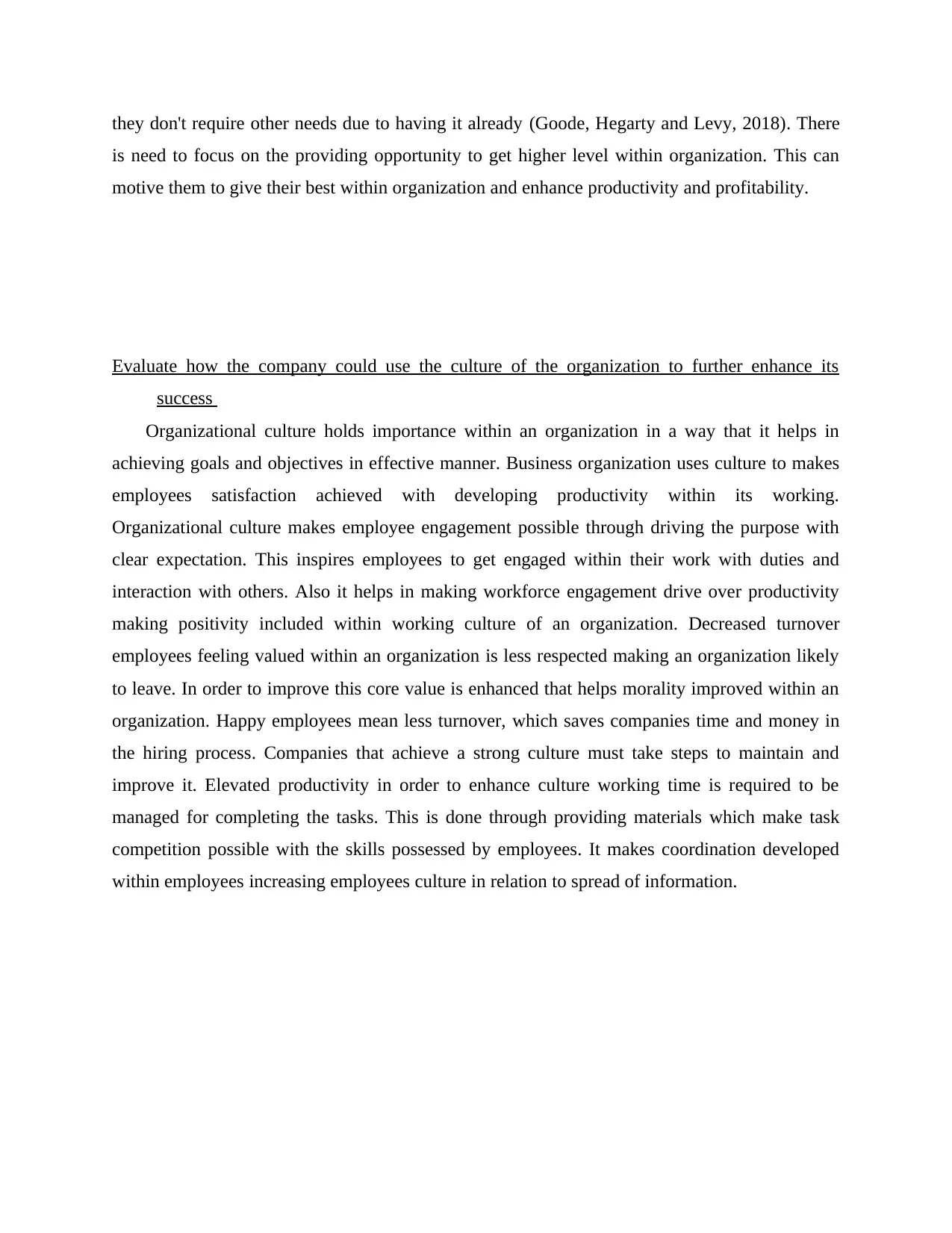
they don't require other needs due to having it already (Goode, Hegarty and Levy, 2018). There
is need to focus on the providing opportunity to get higher level within organization. This can
motive them to give their best within organization and enhance productivity and profitability.
Evaluate how the company could use the culture of the organization to further enhance its
success
Organizational culture holds importance within an organization in a way that it helps in
achieving goals and objectives in effective manner. Business organization uses culture to makes
employees satisfaction achieved with developing productivity within its working.
Organizational culture makes employee engagement possible through driving the purpose with
clear expectation. This inspires employees to get engaged within their work with duties and
interaction with others. Also it helps in making workforce engagement drive over productivity
making positivity included within working culture of an organization. Decreased turnover
employees feeling valued within an organization is less respected making an organization likely
to leave. In order to improve this core value is enhanced that helps morality improved within an
organization. Happy employees mean less turnover, which saves companies time and money in
the hiring process. Companies that achieve a strong culture must take steps to maintain and
improve it. Elevated productivity in order to enhance culture working time is required to be
managed for completing the tasks. This is done through providing materials which make task
competition possible with the skills possessed by employees. It makes coordination developed
within employees increasing employees culture in relation to spread of information.
is need to focus on the providing opportunity to get higher level within organization. This can
motive them to give their best within organization and enhance productivity and profitability.
Evaluate how the company could use the culture of the organization to further enhance its
success
Organizational culture holds importance within an organization in a way that it helps in
achieving goals and objectives in effective manner. Business organization uses culture to makes
employees satisfaction achieved with developing productivity within its working.
Organizational culture makes employee engagement possible through driving the purpose with
clear expectation. This inspires employees to get engaged within their work with duties and
interaction with others. Also it helps in making workforce engagement drive over productivity
making positivity included within working culture of an organization. Decreased turnover
employees feeling valued within an organization is less respected making an organization likely
to leave. In order to improve this core value is enhanced that helps morality improved within an
organization. Happy employees mean less turnover, which saves companies time and money in
the hiring process. Companies that achieve a strong culture must take steps to maintain and
improve it. Elevated productivity in order to enhance culture working time is required to be
managed for completing the tasks. This is done through providing materials which make task
competition possible with the skills possessed by employees. It makes coordination developed
within employees increasing employees culture in relation to spread of information.
Paraphrase This Document
Need a fresh take? Get an instant paraphrase of this document with our AI Paraphraser
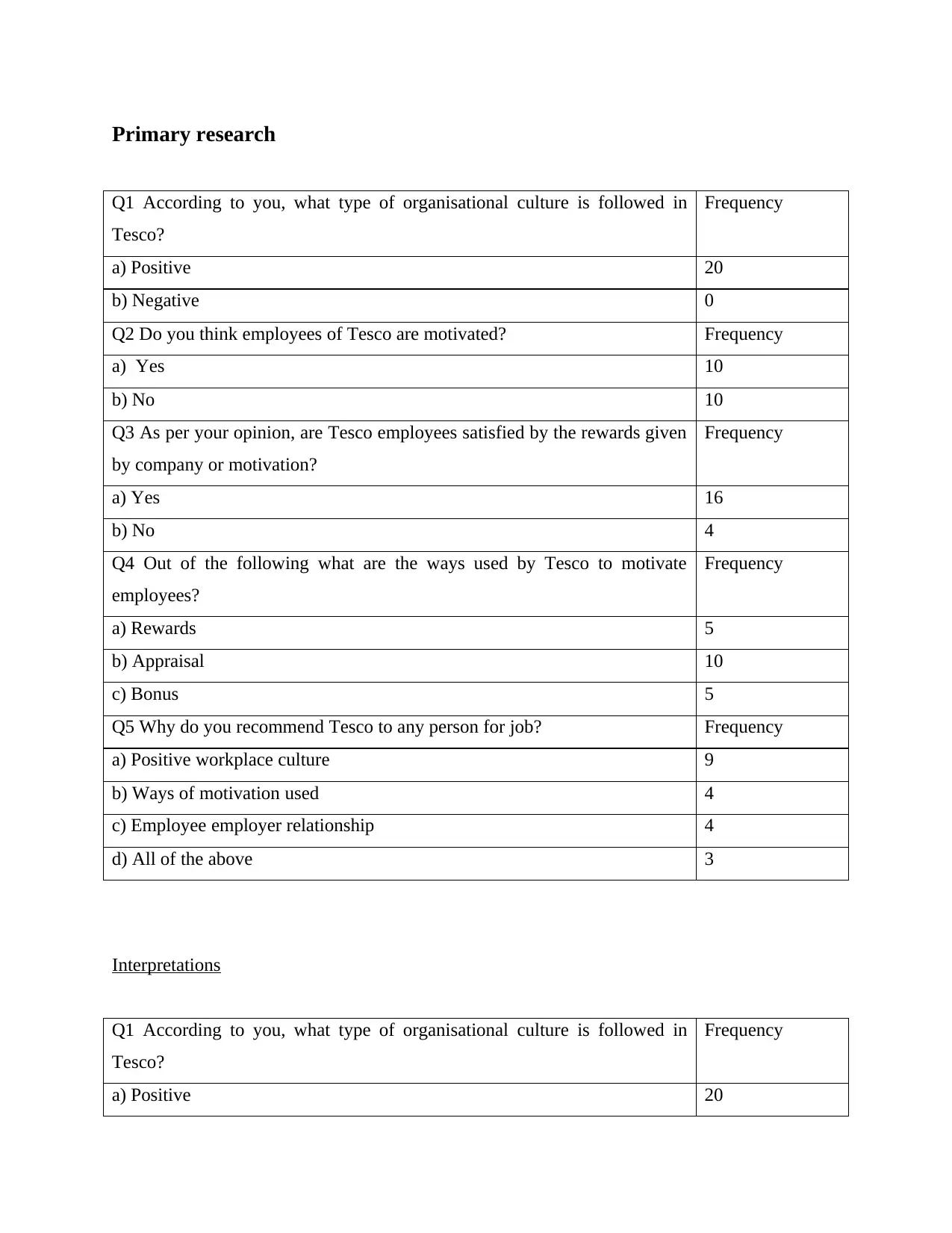
Primary research
Q1 According to you, what type of organisational culture is followed in
Tesco?
Frequency
a) Positive 20
b) Negative 0
Q2 Do you think employees of Tesco are motivated? Frequency
a) Yes 10
b) No 10
Q3 As per your opinion, are Tesco employees satisfied by the rewards given
by company or motivation?
Frequency
a) Yes 16
b) No 4
Q4 Out of the following what are the ways used by Tesco to motivate
employees?
Frequency
a) Rewards 5
b) Appraisal 10
c) Bonus 5
Q5 Why do you recommend Tesco to any person for job? Frequency
a) Positive workplace culture 9
b) Ways of motivation used 4
c) Employee employer relationship 4
d) All of the above 3
Interpretations
Q1 According to you, what type of organisational culture is followed in
Tesco?
Frequency
a) Positive 20
Q1 According to you, what type of organisational culture is followed in
Tesco?
Frequency
a) Positive 20
b) Negative 0
Q2 Do you think employees of Tesco are motivated? Frequency
a) Yes 10
b) No 10
Q3 As per your opinion, are Tesco employees satisfied by the rewards given
by company or motivation?
Frequency
a) Yes 16
b) No 4
Q4 Out of the following what are the ways used by Tesco to motivate
employees?
Frequency
a) Rewards 5
b) Appraisal 10
c) Bonus 5
Q5 Why do you recommend Tesco to any person for job? Frequency
a) Positive workplace culture 9
b) Ways of motivation used 4
c) Employee employer relationship 4
d) All of the above 3
Interpretations
Q1 According to you, what type of organisational culture is followed in
Tesco?
Frequency
a) Positive 20
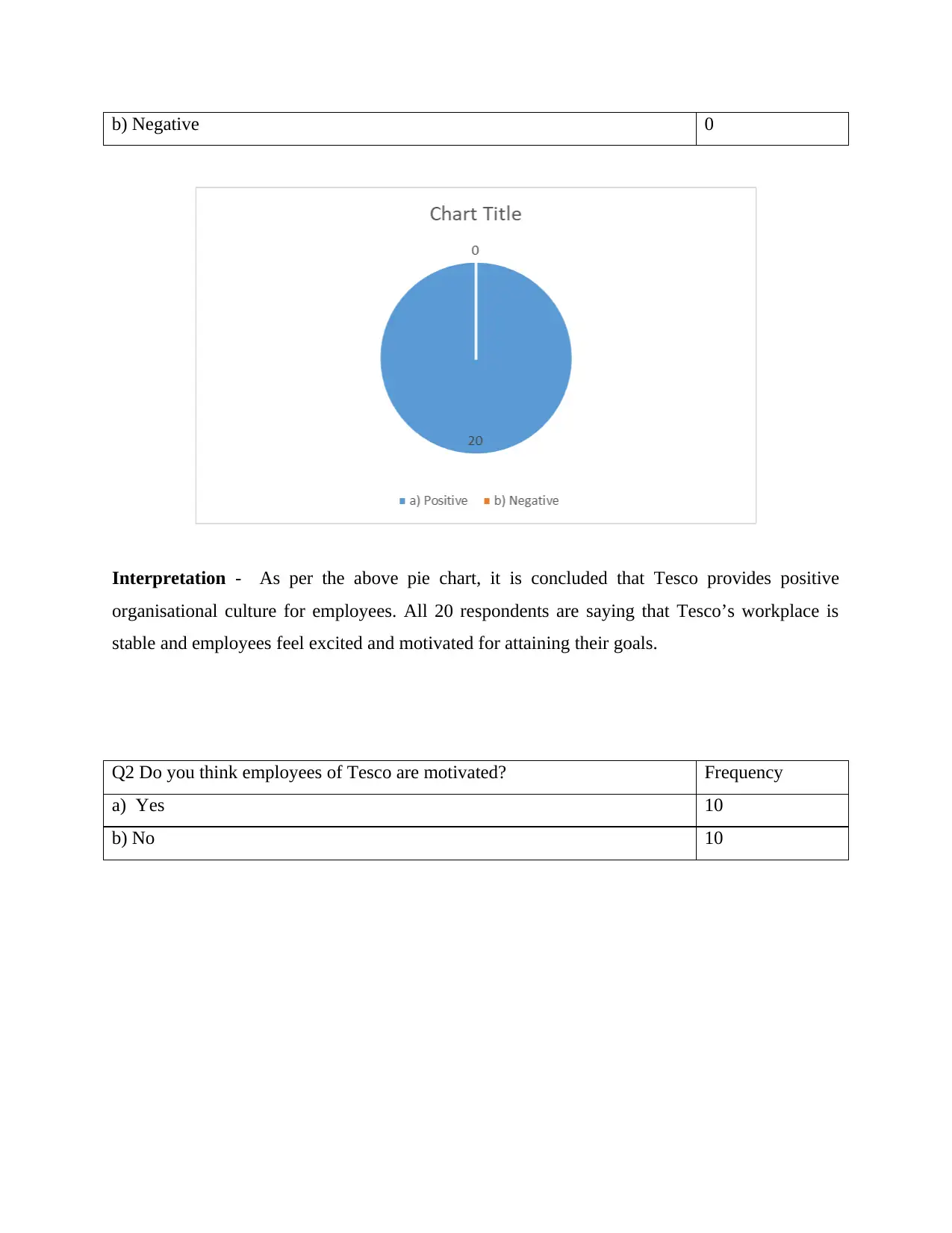
b) Negative 0
Interpretation - As per the above pie chart, it is concluded that Tesco provides positive
organisational culture for employees. All 20 respondents are saying that Tesco’s workplace is
stable and employees feel excited and motivated for attaining their goals.
Q2 Do you think employees of Tesco are motivated? Frequency
a) Yes 10
b) No 10
Interpretation - As per the above pie chart, it is concluded that Tesco provides positive
organisational culture for employees. All 20 respondents are saying that Tesco’s workplace is
stable and employees feel excited and motivated for attaining their goals.
Q2 Do you think employees of Tesco are motivated? Frequency
a) Yes 10
b) No 10
⊘ This is a preview!⊘
Do you want full access?
Subscribe today to unlock all pages.

Trusted by 1+ million students worldwide
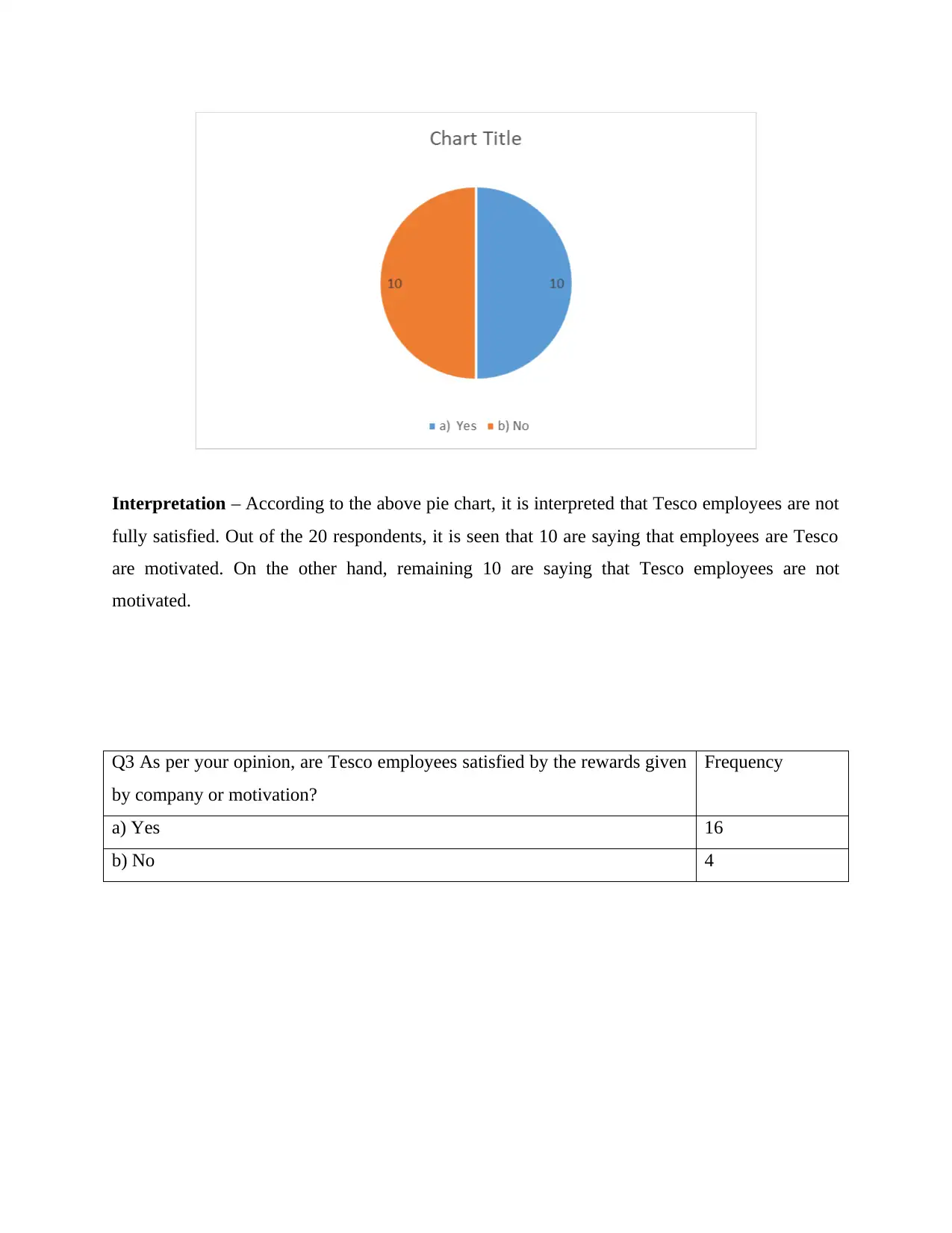
Interpretation – According to the above pie chart, it is interpreted that Tesco employees are not
fully satisfied. Out of the 20 respondents, it is seen that 10 are saying that employees are Tesco
are motivated. On the other hand, remaining 10 are saying that Tesco employees are not
motivated.
Q3 As per your opinion, are Tesco employees satisfied by the rewards given
by company or motivation?
Frequency
a) Yes 16
b) No 4
fully satisfied. Out of the 20 respondents, it is seen that 10 are saying that employees are Tesco
are motivated. On the other hand, remaining 10 are saying that Tesco employees are not
motivated.
Q3 As per your opinion, are Tesco employees satisfied by the rewards given
by company or motivation?
Frequency
a) Yes 16
b) No 4
Paraphrase This Document
Need a fresh take? Get an instant paraphrase of this document with our AI Paraphraser
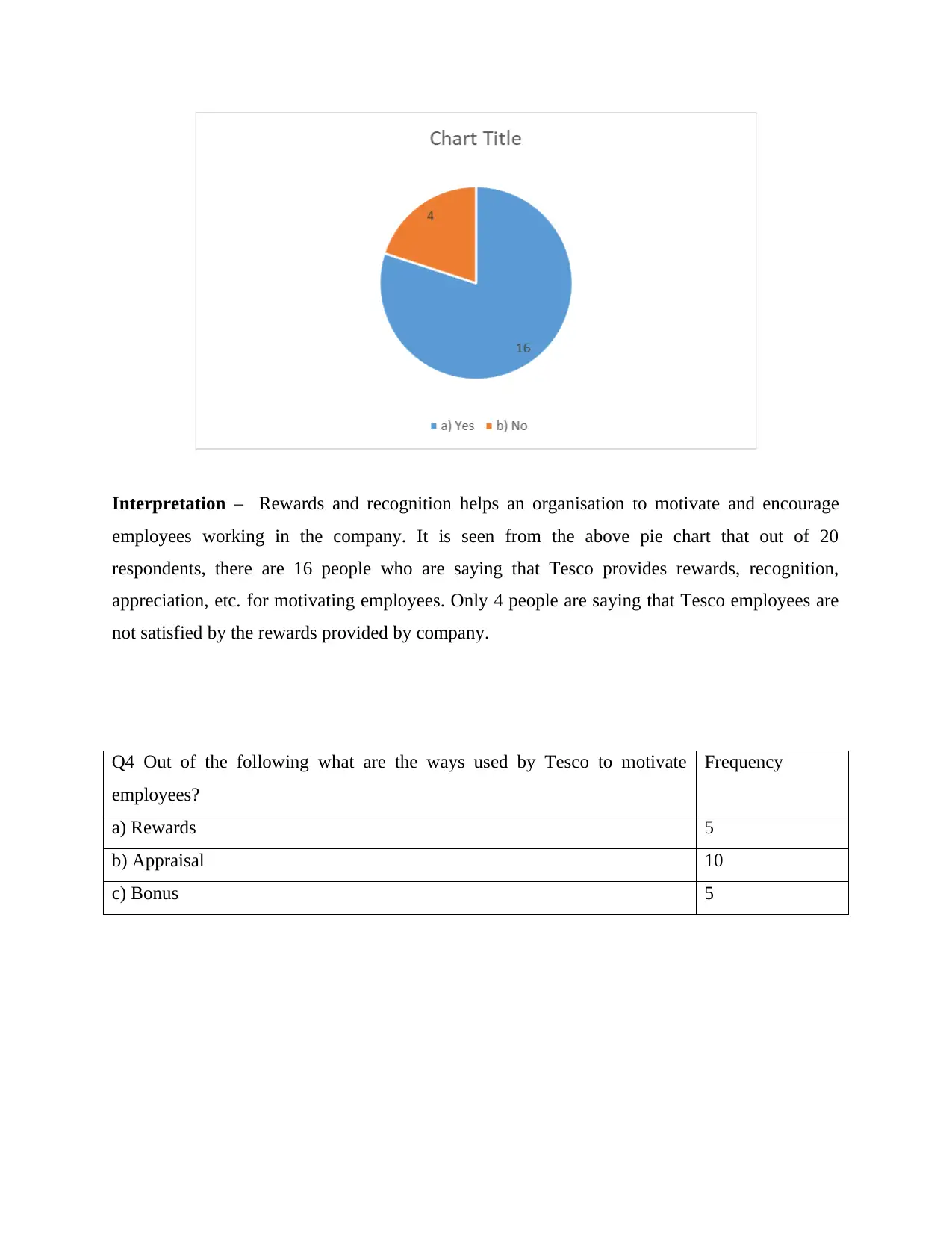
Interpretation – Rewards and recognition helps an organisation to motivate and encourage
employees working in the company. It is seen from the above pie chart that out of 20
respondents, there are 16 people who are saying that Tesco provides rewards, recognition,
appreciation, etc. for motivating employees. Only 4 people are saying that Tesco employees are
not satisfied by the rewards provided by company.
Q4 Out of the following what are the ways used by Tesco to motivate
employees?
Frequency
a) Rewards 5
b) Appraisal 10
c) Bonus 5
employees working in the company. It is seen from the above pie chart that out of 20
respondents, there are 16 people who are saying that Tesco provides rewards, recognition,
appreciation, etc. for motivating employees. Only 4 people are saying that Tesco employees are
not satisfied by the rewards provided by company.
Q4 Out of the following what are the ways used by Tesco to motivate
employees?
Frequency
a) Rewards 5
b) Appraisal 10
c) Bonus 5
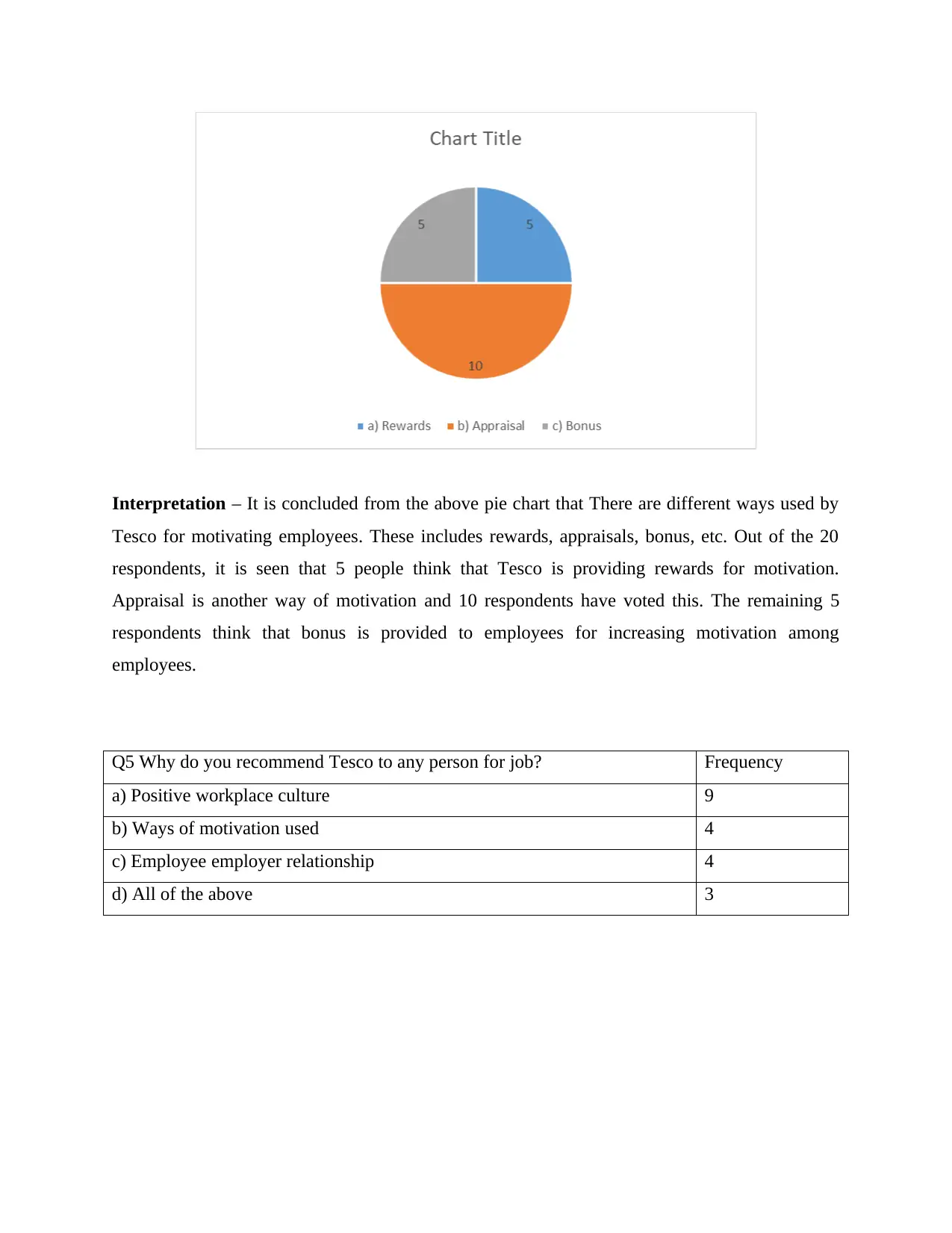
Interpretation – It is concluded from the above pie chart that There are different ways used by
Tesco for motivating employees. These includes rewards, appraisals, bonus, etc. Out of the 20
respondents, it is seen that 5 people think that Tesco is providing rewards for motivation.
Appraisal is another way of motivation and 10 respondents have voted this. The remaining 5
respondents think that bonus is provided to employees for increasing motivation among
employees.
Q5 Why do you recommend Tesco to any person for job? Frequency
a) Positive workplace culture 9
b) Ways of motivation used 4
c) Employee employer relationship 4
d) All of the above 3
Tesco for motivating employees. These includes rewards, appraisals, bonus, etc. Out of the 20
respondents, it is seen that 5 people think that Tesco is providing rewards for motivation.
Appraisal is another way of motivation and 10 respondents have voted this. The remaining 5
respondents think that bonus is provided to employees for increasing motivation among
employees.
Q5 Why do you recommend Tesco to any person for job? Frequency
a) Positive workplace culture 9
b) Ways of motivation used 4
c) Employee employer relationship 4
d) All of the above 3
⊘ This is a preview!⊘
Do you want full access?
Subscribe today to unlock all pages.

Trusted by 1+ million students worldwide
1 out of 15
Related Documents
Your All-in-One AI-Powered Toolkit for Academic Success.
+13062052269
info@desklib.com
Available 24*7 on WhatsApp / Email
![[object Object]](/_next/static/media/star-bottom.7253800d.svg)
Unlock your academic potential
Copyright © 2020–2026 A2Z Services. All Rights Reserved. Developed and managed by ZUCOL.





